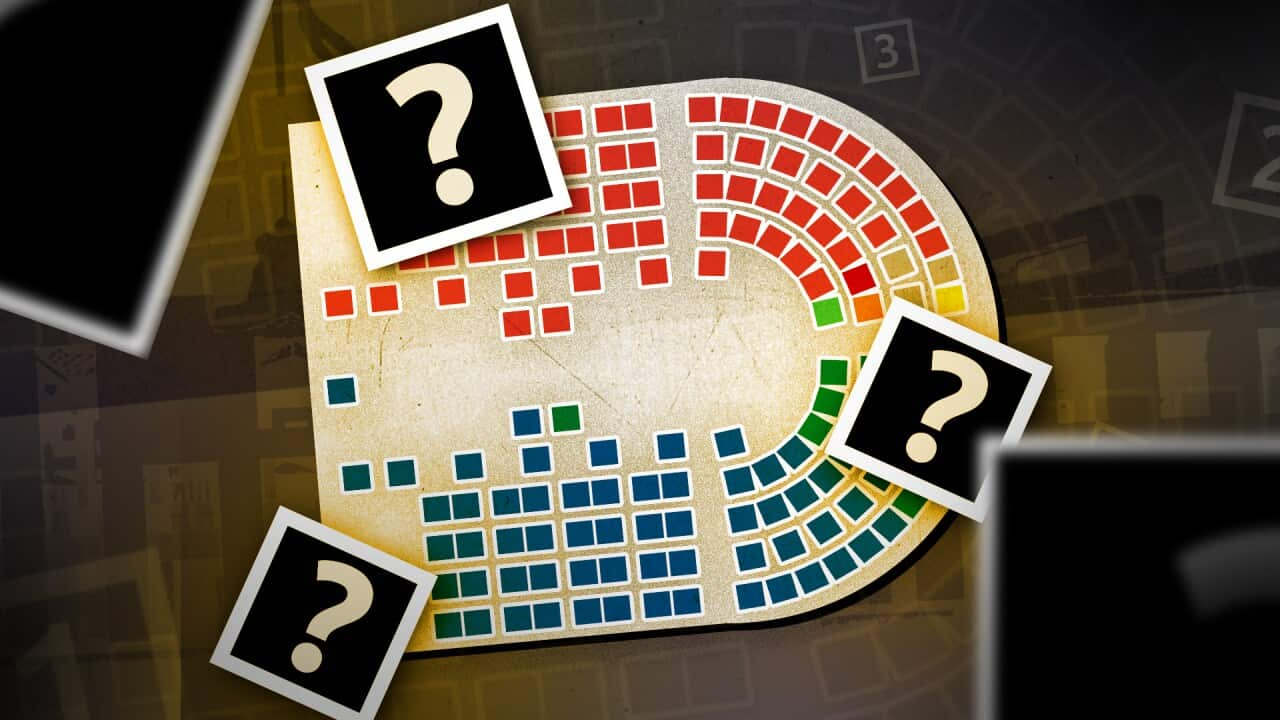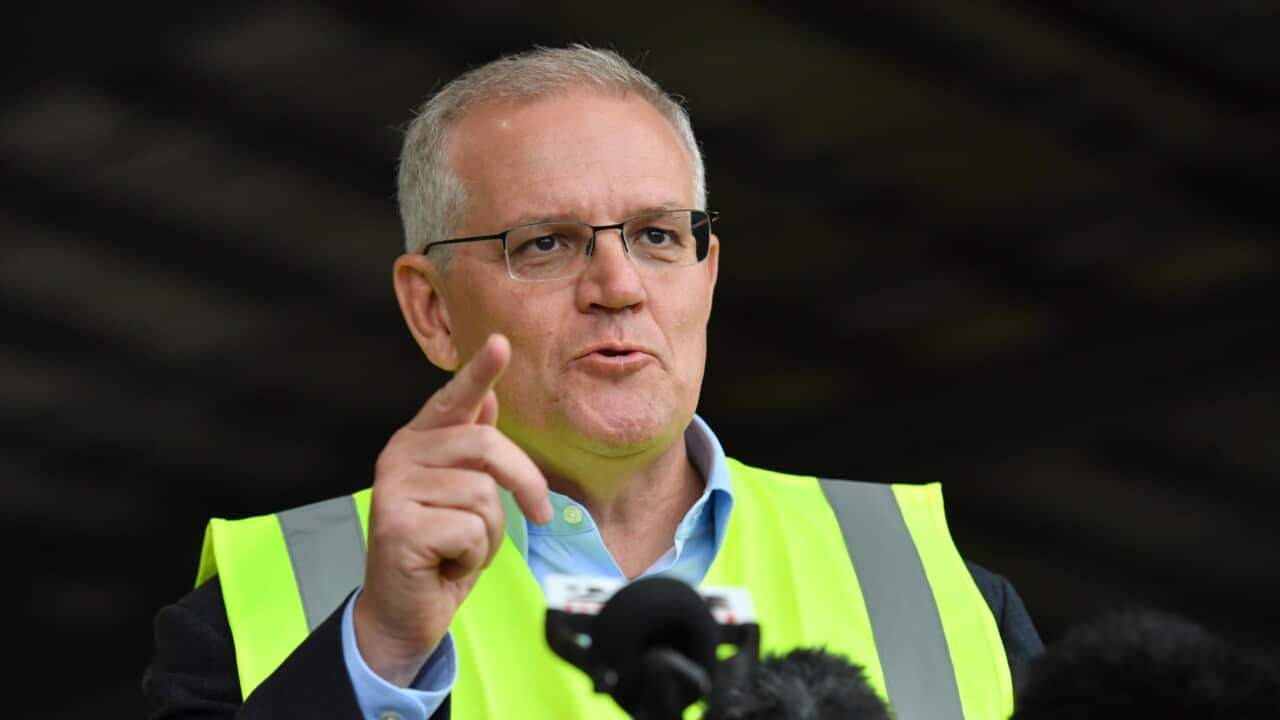As Australians head to the polls on 21 May, there's a chance it could result in a hung parliament.
A hung parliament is when no party, or coalition of parties — like the Liberal-Nationals — wins at least 76 seats in the 151-seat House of Representatives.
When there's a hung parliament, no party can pass bills in the lower house without gaining support from the crossbench or other parties, giving them the balance of power.
The last time this happened was in 2010, when Labor and the Coalition both won 72 seats each, the Greens won one and four independents were elected.
After negotiations with the Greens and independent MPs, Julia Gillard managed to form a minority Labor government.
The only other hung parliament since 1910, when Australia cemented its two-party system, occurred at the 1940 federal election.
The then-incumbent prime minister Robert Menzies, who led the United Australia Party, secured the support of the two independents in parliament to form government.

Former prime minister Julia Gillard speaks during House of Representatives question time at Parliament House in Canberra in 2013. Source: AAP / LUKAS COCH/AAPIMAGE
How likely is a hung parliament this election?
The latest polls suggest Labor will win the election with a modest majority.
A YouGov poll commissioned by the Australian newspaper, with a sample size of almost 19,000 voters, predicts Labor winning 80 seats — four more than it needs to govern in its own right.
If replicated on 21 May, the poll results suggest the Coalition would be reduced to 63 seats in the lower house, with Greens MP Adam Bandt re-elected, along with seven independents.
But if , it's that the only poll that can really be trusted is the one on election day.
If a few of the so-called teal independent candidates challenging Liberal MPs in blue-ribbon electorates are successful, which polls suggest is likely, and Labor doesn't keep all 69 seats it notionally holds and gain at least seven more, then a hung parliament would be on the cards.
What happens when an election delivers a hung parliament?
In the event of a hung parliament, it's up to the incumbent prime minister to decide what happens next.
That means Scott Morrison could choose to resign on behalf of the government, try to stay in office and see if he can survive a no-confidence vote in parliament, or stay in office while negotiating with the crossbench to try to gain their support.
In 2010, Julia Gillard opted to do the latter.
Labor secured a formal agreement with the Greens, before continuing negotiations for more than two weeks with the other crossbenchers.
The party eventually reached confidence and supply deals with independents Tony Windsor, and , giving in the 76-seat majority it needed in the lower house.
That means the independents guaranteed they would vote with the government or abstain on any motion of confidence or no-confidence brought in the lower house, while also supporting it in the passage of certain bills.
The crossbenchers didn't give their support in 2010 without getting something in return though, and in 2012 when Ms Gillard broke the agreement she made with Mr Wilkie about poker machine reform, .
What have Scott Morrison and Anthony Albanese said they will do?
Both Scott Morrison and Anthony Albanese are campaigning to form majority governments, with the prime minister last week .
"This is a choice for the Australian people," he said.
"My answer to that is that answer lies in the lap of the Australian people. I put my trust in their good conscience and their good faith."
They have also both said they don't intend to do deals with independent candidates to form a minority government.

Opposition leader Anthony Albanese (left) listens to Australian Prime Minister Scott Morrison during House of Representatives Question Time at Parliament House in Canberra. Source: AAP / LUKAS COCH/AAPIMAGE
Greens leader Adam Bandt has already indicated his party would seek to strike a deal with Labor, in the event of a hung parliament, while Centre Alliance MP Rebekha Sharkie said that she would reach out to the Coalition first.
"In the unlikely event of a hung parliament, my community would expect me to speak with the current government first. I would afford the ALP the same courtesy if they were in government," Ms Sharkie said in a statement last month.
Andrew Wilkie said after his experience with the Gillard government, he won't make any formal deals with either party, while fellow independent Helen Haines has said creating a federal integrity commission "with teeth" will be her key negotiating demand.
"If we're trying to shine a light into dark places, we must have that level of accountability," Dr Haines told a panel discussion on Wednesday.
Independent MP Zali Steggal said she would make her decision about which party to support in minority based on their policies and the overall make-up of parliament.
But she did indicate in March she would be more likely to support the Coalition
"I do have grave concerns in relation to Scott Morrison’s leadership," she said on the ABC's Q+A program.
The other so-called teal independent candidates are also reserving their judgements until after the results come in.
How effective have minority governments been in the past?
Scott Morrison has consistently warned of the "chaos and instability" of hung parliaments.
And while it's true that they can require some deal-making to get legislation passed and unfairness in funding decisions, forcing a government to explain and justify every bill on its merits can result in greater parliamentary consensus on issues.
Hung parliaments can also take their toll on the people who control the balance of power.
"After the 43rd parliament, I was exhausted," Rob Oakeshott said in 2016, reflecting on the hard work it took to get the Senate and House of Representatives to work together for a full term.
But despite all that, it was one of the most productive parliaments in Australian history, certainly more so than the one that was just dissolved.
According to The Conversation, 570 bills were passed by the Senate during the 43rd parliament, including introducing the National Disability Insurance Scheme (NDIS), the child abuse royal commission, carbon and mining taxes and plain packaging laws for cigarettes.
The minority government Robert Menzies led in 1940 was less successful.
After just a year, the independents who had supported his party switched their allegiance, voting with Labor to defeat the government and bring John Curtin to power in 1941.
What about other countries?
Hung parliaments are more common in some countries than others, depending on their voting system.
Canada's current government is ruling in minority, as is Denmark's, Spain's, Israel's, and several others.
From 1996, when Mixed Member Proportional voting was introduced, to Labour's election victory in 2020, no party gained an outright majority of at least 61 seats in New Zealand's parliament.
The most recent hung parliament was in 2017, when Jacinda Ardern's left-leaning Labour Party formed a coalition government with Wiston Peters' nationalist and populist New Zealand First.
Labour secured 46 seats and New Zealand First nine, with the Green Party, which won eight seats, providing the coalition with confidence and supply.
That gave the coalition 63 seats to the Nationals' 56 — enough to ensure Ms Ardern became prime minister and maintained the confidence of the lower house.
Mr Peters was given the role of deputy prime minister.















